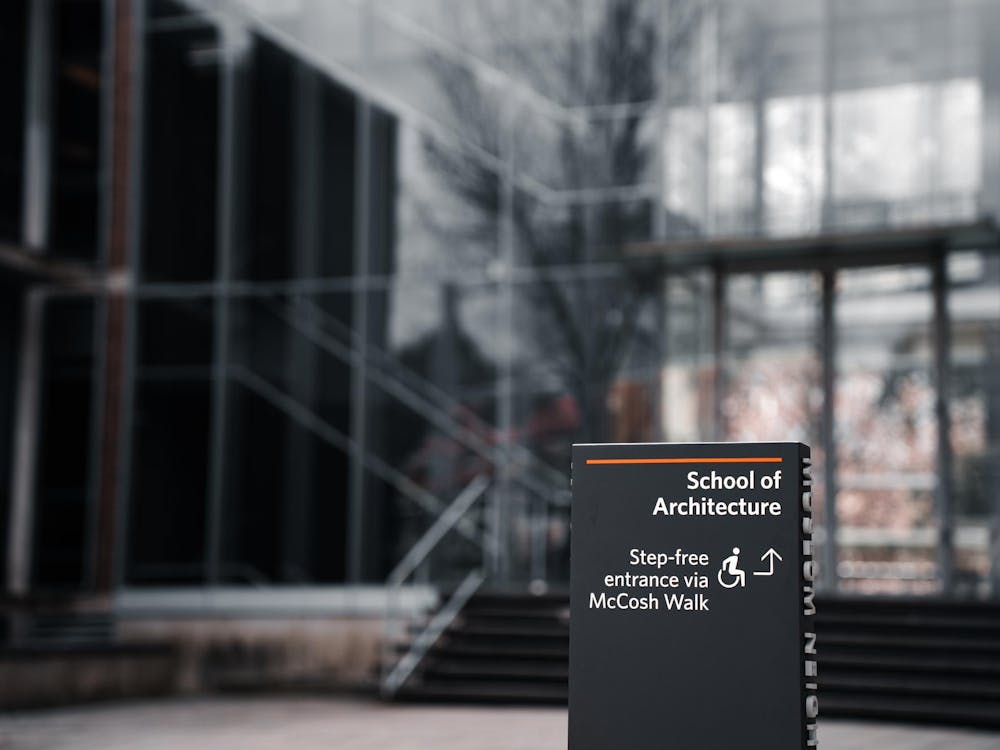When Amy Gutmann was a child she knew that her family was different. They did not use ketchup. There were no peanut butter and jelly sandwiches. Her father had an accent — German — though the pictures in the house were snapshots of a life lived in India, not Germany. She wondered why.
Later she learned the story — that her father had escaped from the Nazis in 1934, was denied entrance to the United States and settled in India for 14 years. On a vacation to America, he attended a benefit at the Essex Hotel in Manhattan where he was interviewed by a woman. He asked her to dinner and she paused. I'm not really a reporter, she confessed. She had snuck in — her daughter posited decades later — to see how the other half lived.
Weeks later the two were married.
"Not everything that's slightly deceptive is bad," said Gutmann, the founding director of the Center of Human Values, grinning.
Born into an immigrant family formed out of the shadows of the Holocaust, Gutmann was exposed early to an atmosphere of ethical examination. Her father embraced America as the land of opportunity — but it had been closed to him at his most crucial moment. Her life, Gutmann realized, was because of Nazi Germany. So was her parents' marriage. It was a horrible thought.
"What gives value to our life? What makes life meaningful?" she asked. "Are there any good answers to these questions? That's always fascinated me — for as long as I have memories that have to do with issues of good and evil."
After coming to Princeton, she and a group of faculty members approached President Shapiro, asking for support to fund a center where students and faculty from across the University — and the world — could gather to try to understand these issues. They found Laurance Rockefeller '32, who had spent his lifetime pondering these concerns, and he agreed to provide funding.
The center celebrated its 10th year at the University last week with a series of panel discussions among prominent scholars and artists associated with the center throughout its history — including syndicated columnist George Will GS '68, ethicist Peter Singer and writer Joyce Carol Oates. Debating topics that focused on the role of values in contemporary society, the event was designed to showcase the center's primary purpose: to provide a forum where fundamental questions can be explored across disciplines.

Since it was founded, the center has experienced near-exponential growth. From one freshman seminar in 1990, the center will sponsor 12 next year. From "basically no faculty members," Gutmann said, there are now five full-time professors and 24 associate professors.
Singer is one of the newest — and most controversial — of the center's appointments. In a speech on a panel titled "How Should Values be Taught in the University," he responded to an article in The Daily Princetonian that detailed his effect on the lives of several students.
"It raises the question — is that what I'm trying to achieve in my course? To get students to accept my views as their own?" he asked.
After the symposium, Singer said he will be searching the final papers for his class closely, scanning for signs of parroting back lectures instead of original thought.

"That's the thing you worry about. You want to encourage them in the right direction, but at the same time, are you pushing your own views down their throats?" he asked.
Faculty from across the country agreed — and in the conference a range of ideas were on display.
"Values are choices that can be as impermanent and transient as a choice of ice cream," said Will, arguing that virtues should replace values as the subject of study.
"The connotation of virtue is puritanical, finite and presumptive," author Toni Morrison said.
"Wait a minute," Will said. "I wouldn't go as far as to say that Puritans have the market on virtues."
After the panel ended, several members stayed, arguing, as Gutmann beamed.
Dennis Thompson, director of the Havard University Center for Ethics and the Professions, congratulated Gutmann on her accomplishment. "The Princeton Center in 10 short years has become the place to go for faculty who are interested in studying human values from the perspective of almost any discipline," he said in an interview conducted via e-mail. "Amy Gutmann and her colleagues have created a mecca for scholars who want to write about fundamental questions of values in a way that combines theory and practice. The Princeton Center has been a leader — a model and inspiration for other centers — in what is now an international movement."
Since she was a child, international issues have always been among Gutmann's particular concerns. When the Vietnam War broke out during Gutmann's undergraduate years at Harvard University, she protested fiercely, joining campaigns and criticizing the administration. But even as she argued, Gutmann felt unprepared by her education — she did not know how to respond analytically to something she intuitively felt was unjust.
She has tried to correct that problem for new waves of undergraduates at Princeton.
"It's an important challenge for higher education: How do you have an education that keeps the big questions and also prepares students with technical knowledge?" Gutmann asked. "So we say, pick your major, but take some of these courses too. That's the glory of it."







